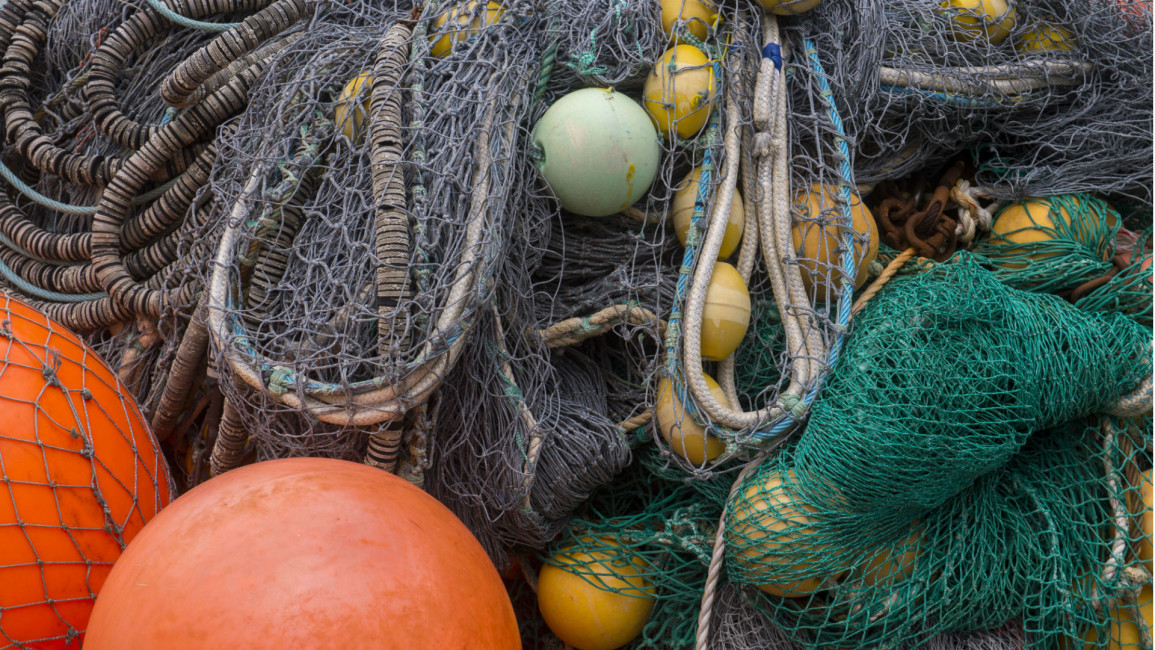
Western Sahara proves sticking point in EU-Morocco fisheries deal
Western Sahara proves sticking point in EU-Morocco fisheries deal
The EU finds itself obliged to either include Western Sahara in renewing the agreement, a breach of its own law, or cancel the trade accord with Morocco.
4 min read
Morocco's deal with Europe was based on its assumed sovereignty over Sahara's coastline [Getty]
On February 27, the EU's Court of Justice issued its final decision to invalidate the EU-Morocco fisheries agreement that included the Western Sahara territory.
The deal had been based on Morocco's claim of sovereignty over Western Sahara's coastline - and, therefore, its marine resources.
The court referenced the International Court of Justice, which considers Western Sahara a non-self-governing territory awaiting a referendum to be organised so that indigenous Sahrawis can practice their right of self-determination.
The former Spanish colony has been at the centre of all EU-Morocco trade agreements, from phosphates to fisheries, however, those agreements have now been nullified by the ECJ, which has also excluded Western Sahara from an agricultural trade accord signed by Morocco and the EU in 2012.
In fact, the law that the EU referenced as a standard to its bilateral relations with other nations is now becoming a challenge in the Western Sahara Natural Resources case.
While Morocco has been offering those resources to the EU for years, European nations have benefited from those agreements to depend on Morocco as a strategic and economic partner, providing a greater opportunity for the EU to meet its needs - especially since Mauritania has been dominated by the Chinese market and has been distancing itself from Europe.
However, the fisheries agreement had included the Western Sahara basin of El Aaiun, which extends almost 1100km, divided between Boujdour North and Dakhla South, and forms 90 percent of the agreed EU-Morocco fisheries area.
Thus, the EU will now find itself obliged either to include Western Sahara in renewing the agreement, which would be a breach of its own law - or cancel the trade accord with Morocco, which would drive Morocco to lean on other potential partners such as Japan or China, who have been waiting on the line for years.
However, Japan and China could also face the same fate as Europe if Western Sahara's Polisario Front takes them to the International Court of Justice over the matter.
Companies including Canada's Potash and America's Kosmos withdrew from Western Sahara even before the European court decision was made.
The ECJ ruling has also hit the Transavia, part of the Air France-KLM group, which was taken to a French court by the Polisario, which demanded 400,000 euro ($495,000) in compensation for flying to a disputed zone illegally after the airline began regular flights to Dakhla.
The Polisario Front's victory at the ECJ has strengthened its political position in wanting a seat at the negotiating table over any future EU fisheries deal.
The timing of the announcement, long-awaited by Sahrawis, coincided with the commemoration of the foundation of RASD, the Sahrawi Arab Democratic Republic, and the direct talks that Kohler held with Sahrawi and Moroccan parties separately to prepare for direct negotiation between the two rivals.
After this latest setback to Moroccan diplomacy in Europe, El Uthmani, appointed by King Mohamed VI, conveyed a royal message to Europe - there would be no fisheries deal without including Morocco's sovereignty over Western Sahara's maritime territory as part of it.
Europe has not yet responded, with the situation hanging in the air until July, when the EU will decide whether to abide by the court's verdict.
The Polisario has expressed its readiness to discuss agreements with the EU in Western Sahara but it has not ruled out legal action against the EU if it does not abide by its own legal rulings.
Mohamed Sidati and Mohamed Khaddad, who lead the Polisario diplomatic corps, have also said they would seek about $300 million from European companies active in Western Sahara without the Polisario's consent.
A solidarity group, the WSC UK, filed the fisheries case with the UK's highest court, which forwarded it to the ECJ. The Moroccan side, meanwhile, has focused on political lobbying.
Subsequently, the Polisario Front and its supporters knew how to approach the EU and put it in a critical situation that would demand a response that would cost it its closest North African ally, and empower the Polisario legally and economically in the international arena, and in particular, in the UN peace process that has been ongoing for decades to reach a solution for the Western Sahara question.
Habibulah Mohamed Lamin is a journalist formerly based in the Western Sahara refugee camps in Tindouf, Algeria. He has worked as a translator and is director of Equipe Media Branch, a group of media activists covering Western Sahara. His work focuses on the politics and culture of the Maghreb.
Follow him on Twitter: @habibullahWS
The deal had been based on Morocco's claim of sovereignty over Western Sahara's coastline - and, therefore, its marine resources.
The court referenced the International Court of Justice, which considers Western Sahara a non-self-governing territory awaiting a referendum to be organised so that indigenous Sahrawis can practice their right of self-determination.
The former Spanish colony has been at the centre of all EU-Morocco trade agreements, from phosphates to fisheries, however, those agreements have now been nullified by the ECJ, which has also excluded Western Sahara from an agricultural trade accord signed by Morocco and the EU in 2012.
In fact, the law that the EU referenced as a standard to its bilateral relations with other nations is now becoming a challenge in the Western Sahara Natural Resources case.
While Morocco has been offering those resources to the EU for years, European nations have benefited from those agreements to depend on Morocco as a strategic and economic partner, providing a greater opportunity for the EU to meet its needs - especially since Mauritania has been dominated by the Chinese market and has been distancing itself from Europe.
However, the fisheries agreement had included the Western Sahara basin of El Aaiun, which extends almost 1100km, divided between Boujdour North and Dakhla South, and forms 90 percent of the agreed EU-Morocco fisheries area.
Thus, the EU will now find itself obliged either to include Western Sahara in renewing the agreement, which would be a breach of its own law - or cancel the trade accord with Morocco, which would drive Morocco to lean on other potential partners such as Japan or China, who have been waiting on the line for years.
 |
Japan and China could also face the same fate as Europe if Western Sahara's Polisario Front takes them to the International Court of Justice over the matter |  |
However, Japan and China could also face the same fate as Europe if Western Sahara's Polisario Front takes them to the International Court of Justice over the matter.
Companies including Canada's Potash and America's Kosmos withdrew from Western Sahara even before the European court decision was made.
The ECJ ruling has also hit the Transavia, part of the Air France-KLM group, which was taken to a French court by the Polisario, which demanded 400,000 euro ($495,000) in compensation for flying to a disputed zone illegally after the airline began regular flights to Dakhla.
The Polisario Front's victory at the ECJ has strengthened its political position in wanting a seat at the negotiating table over any future EU fisheries deal.
The timing of the announcement, long-awaited by Sahrawis, coincided with the commemoration of the foundation of RASD, the Sahrawi Arab Democratic Republic, and the direct talks that Kohler held with Sahrawi and Moroccan parties separately to prepare for direct negotiation between the two rivals.
After this latest setback to Moroccan diplomacy in Europe, El Uthmani, appointed by King Mohamed VI, conveyed a royal message to Europe - there would be no fisheries deal without including Morocco's sovereignty over Western Sahara's maritime territory as part of it.
 |
The Polisario has expressed its readiness to discuss agreements with the EU in Western Sahara but it has not ruled out legal action against the EU |  |
Europe has not yet responded, with the situation hanging in the air until July, when the EU will decide whether to abide by the court's verdict.
The Polisario has expressed its readiness to discuss agreements with the EU in Western Sahara but it has not ruled out legal action against the EU if it does not abide by its own legal rulings.
Mohamed Sidati and Mohamed Khaddad, who lead the Polisario diplomatic corps, have also said they would seek about $300 million from European companies active in Western Sahara without the Polisario's consent.
A solidarity group, the WSC UK, filed the fisheries case with the UK's highest court, which forwarded it to the ECJ. The Moroccan side, meanwhile, has focused on political lobbying.
Subsequently, the Polisario Front and its supporters knew how to approach the EU and put it in a critical situation that would demand a response that would cost it its closest North African ally, and empower the Polisario legally and economically in the international arena, and in particular, in the UN peace process that has been ongoing for decades to reach a solution for the Western Sahara question.
Habibulah Mohamed Lamin is a journalist formerly based in the Western Sahara refugee camps in Tindouf, Algeria. He has worked as a translator and is director of Equipe Media Branch, a group of media activists covering Western Sahara. His work focuses on the politics and culture of the Maghreb.
Follow him on Twitter: @habibullahWS




